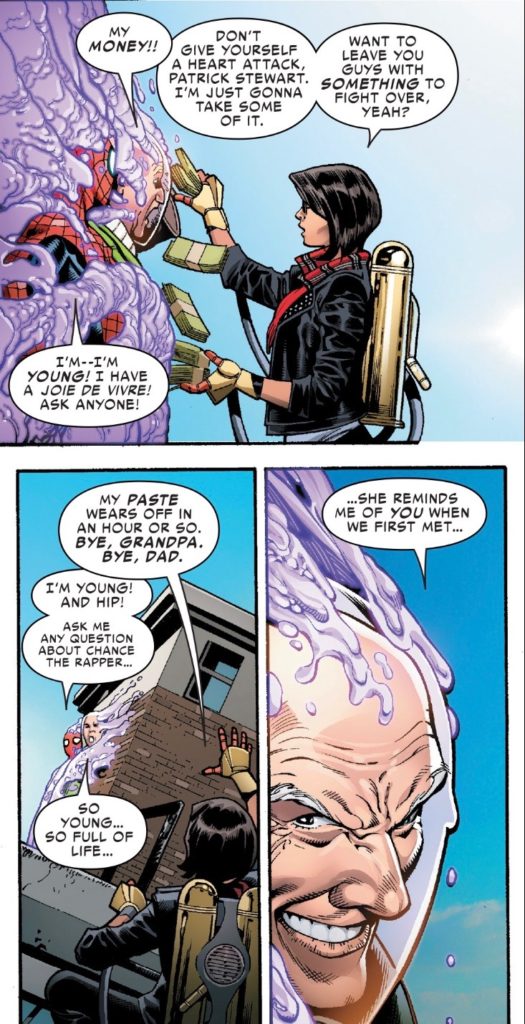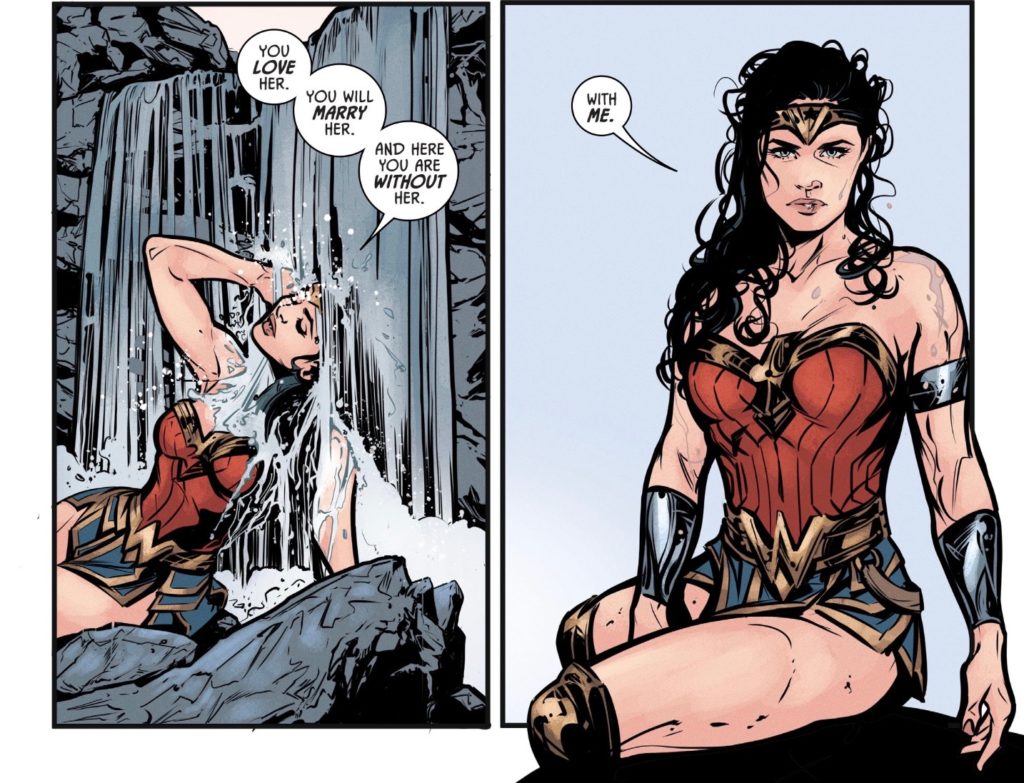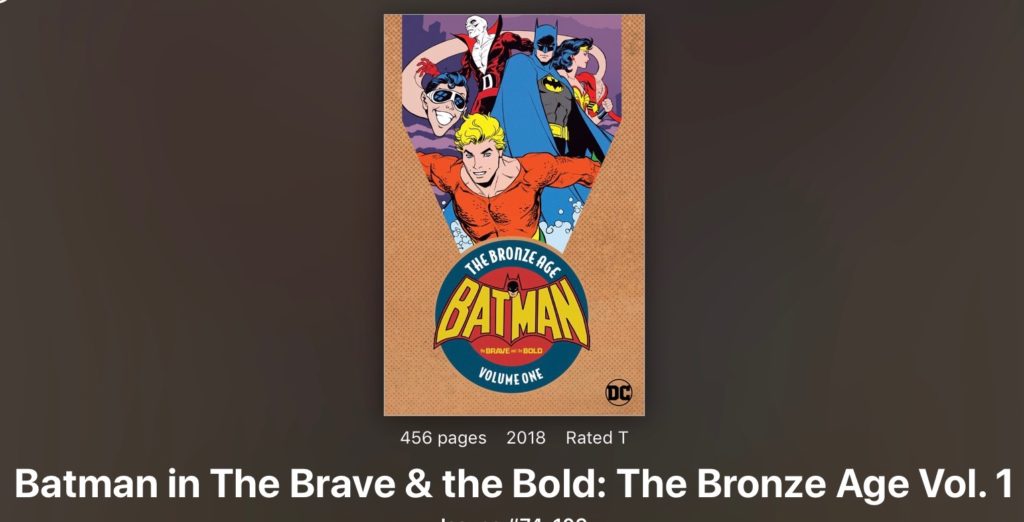Hey there, friends. The government may have shut down but not your friendly neighborhood Wait, What? Yes, we have a terrifyingly-close-to-two-and-a-half-hour installment for you!
Topics discussed:
- How many people we follow on Twitter(!);
- Comics news round-up featuring: the return of the red trunks; Bendis in Action Comics #1000; Dan Slott leaving Spider-Man to take over Iron Man; Kelly Thompson is now Marvel Exclusive; and, as Graeme perfectly puts it, “Wolverine is back, in the most fucking confusing manner ever!”
- The gap between Marvel’s sales and Marvel’s talent: Thompson on Hawkeye; Zdarsky on Spectacular Spider-Man; Al Ewing’s Ultimates and Ultimates2 (with Kenneth Rocafort, Aud Koch, Travel Foreman);
- Graeme’s thoughts on the first two parts of the new Avengers mega-storyline “No Surrender” by Mark Waid, Jim Zub, Al Ewing, and Pepe Larraz;
- Jeff’s thoughts on Batman #39, and a discussion about Tom King and Mister Miracle and DC’s non-Kirby handling of The New Gods overall and a discussion of continuity and character investment as opposed to an investment on a creator’s “take” on a character, which leads in its way to:
- discussions of American Vandal and the Netflix adaptation of Charles Forsman’s TEOTFW, and
- a *very* long—and absolutely spoiler-rich—discussion about Star Wars: The Last Jedi.
- Back to news (kinda): a discussion of Marvel’s new publisher;
- An all-too-brief discussion of the genius Bob Haney, George Tuska, and Vince Colletta story “Will of the Whisperer” from Worlds Finest #252, available on Comixology;
- If you like (or don’t mind) reading comics electronically, see if your library has the Hoopla service, so you can check out and read The Bronze Age Batman Brave and the Bold Omnibus Vol. 1 *for free*;
- Closing comments! Featuring Graeme’s great recap of Justice League of America #123 over at the most excellent Steve Morris’s Shelf Dust; Jeff’s not-so-great job of his half of the closing comments; and a call for you to VOTE!
Whew!
Next week is a skip week but join us in a mere fortnight for Wait, What? Ep. 242, won’t you?






And, for the cutting and pasting part of the equation:
http://theworkingdraft.com/media/podcasts2/WaitWhat241.mp3
I vote for raiding the thesaurus for a different term for “money” each week.
Balsam, rhino, jack…
Hi guys, love the show. I was wondering if it’s too huge of a pain to bring back the time codes in the show notes. I use them sometimes if you spend a while talking about something that I have no frame of reference for or especially if you start talking about something that I plan on reading but haven’t yet. Just listing everything in order doesn’t help me know when one conversation stops and another begins.
Ryan, I’ll be totally honest–the time codes are indeed kind of a pain, in part because they just take a ton of time to nail down in our rambling, ill-defined conversations (and then after I record the intro, they all shift by a time that varies from episode to episode as well). I know they’re helpful, which is why we did them for so long, but since the day job changed up on me, I’ve fought to figure out ways to cut time out of editing.
That said, would it be sufficient if I added time codes that were approximate? That way you could move to the right area, more or less, and then skip about until you find what you want? Let me know your thoughts (and that offer is open to any listener reading this, of course)…
I’ll admit, I’ve never paid much attention to the stamps before, and I can’t guarantee I will in the future, but for this particular episode, I haven’t seen the new Star Wars, so there was a pretty big bout of skipping around the tail end of the podcast.
So in this case, at least, an approximate time code would be fine. (While at the same time, I appreciate that not seeing the Stars Wars by now is my own fault.)
Well, I hardly ever see anything in the cinema any more.
The calculation of the money it costs versus the probability that someone will talk (something that reliably takes me out of the film, every time) just meant that it wasn’t worth it to me any more.
Briefly with Kyllo: To me, The Last Jedi is a fascinating exercise in rug pulling and nowhere is this clearer than with Kyllo Ren. We’re conditioned for setup and payoff. This movie set up an expected result and then subverts that expectation. With Kyllo, we are given the redemption story and shown he’s a complicated guy. When he turns from Snoke, the audience thinks this is the moment. Then we see it’s not true. To me, this movie foreclosed the possibility of any redemption.
Just started listening to the episode, and talk of tweeting. Do you use the Twitter list feature, Jeff? That’s a great way to quickly find posts by folk you especially enjoy. I’m not too shy about tweeting folk who don’t follow me (hi Graeme!).
I see Marvel has announced a new Young Guns artists list, and the excellent Aaron Kuder is on there. CB Cebulski, new talent spotter!
I’m with the show’s consensus that Tom King’s Mister Miracle is a good book, but his take on Lightray is… difficult to connect to Kirby’s conception. I recently was listening to another comics podcast where the presenters were saying KIng had really nailed LIghtray, which suggests to me this ‘take’ will have a long shadow. Ditto that Simonson seems the only creator to give us an Orion with more than one note since Kirby.
Graeme does introduce a troubling note of uncertainty to the podcast, does Doshxit not mean Doshxit? If we must live in chaos then I vote that the ‘special relationship’ between the UK and the US should extend to Jeff saying ‘Dosh’.
I haven’t listened to the podcast yet, but it seems to me that Kirby’s Lightray would need modification if you’re going to use him as anything other than a foil for Orion, which is what Kirby designed him for. All his character-traits come with a footnote saying “unlike Orion.”*
*“And yet — good friends!”
It’s the portrayal of Lightray as some kind of ‘yes-man’ to Orion that doesn’t ring true. He’s loyal, but Kirby repeatedly shows him taking his own approach to their problems and one of the earliest things he does in the series is defy a direct order from Highfather. Of course, King can make this all right in any number of ways.
No question that’s a big departure from Kirby’s Lightray, but I think that it might follow from what I (and, now that I’ve listened to the podcast, one of our hosts) were saying: once you change Orion, you change Lightray.
In this case (disclaimer: haven’t read it) it sounds as if Orion’s been reduced to a foil for Scott Free, so I imagine that he doesn’t need a foil himself now that he’s a secondary character, Might be better not to make much use of Lightray at all under those circumstances, I suppose — just have him be part of the New Genesis furniture.
Obviously, I think Kirby is better, in which Scott and Orion are each heroes of their own books, so that their stories can mutually inform/critique one another, paralleling Kirby’s origin myth.
I echo PersonofCon: approximate time codes would be just fine, or even just time codes specifically for spoiler-y material, as I found myself stopping the podcast on my way to work this morning specifically because I didn’t want to hear spoilers about either The Last Jedi (being the last person on Earth who hasn’t seen it yet, apparently) or TEOTFW.
That said, I fully realize that 1. the onus is on me to see the damn movie already if I don’t want it spoiled; and 2. as the sap who made the jerky request to retire “dosh,” I feel I’m in no position to make any further requests/demands of Jeff.
On your recommendation I downloaded World’s Finest 252 with the Whisperer and holeeeeeee shit!!!! I hope I’m not revealing any spoilers here, but I’m pretty sure blackmail and extortion doesn’t work that way. I think you’re supposed to demand money (or services) from a person in return for NOT revealing compromising information about them. If you reveal the information beforehand… oh never mind. They sure don’t write them like that anymore.
I had to look up up the word “dosh” in the Urban Dictionary and it is described as “The act of having one’s butthole blown on. No contact just air.” In light of that possible interpretation, I would advise against the use of the term dosh in the future. My apologies.
I read from the gospel of Graeme when it comes to TLJ.
FWIW, since Graeme asked for a vote, I’m fine with dosh, scratch, cheddar, payola, corn squeezin’s, space bucks, baby’s tears, or any other words or phrases you guys want to use when expressing gratitude for Patreon donations. I hereby rescind my anti-dosh remarks (although Rob. G’s note on its definition does raise some concerns).
I’ll second space bucks.
I was actually thinking of asking you both if either of had seen Tim Stevens’s SJW article at ComicsVerse but listening to the episode today pushed me over to yes when Jeff invoked similar reasoning for Dirty Harry as Tim did for the rise in popularity of Punisher in the late 80s/early 90s in another article on Cardiac.
Besides breaking down the mathematics of just how oppressed white heroes in comics are, and the answer is not very, I thought the piece also demonstrated something interesting about the Marvel v. DC divide.
I did what Tim did with the shipping list for single hero comics going back a few
months rather than just two weeks and was surprised. Despite the shit Marvel gets for not being good on SJW stuff, they consistently had more titles featuring people of color, women, and people of non-straight sexual orientations. That paired with a tweet storm yesterday about Marvel’s shitty treatment of retailers makes me wonder if a lot of the hate for Marvel has nothing to do with creative, or almost nothing, and is mostly to do with its business practices? Thoughts? Are fans too hard on Marvel for the diversity stuff while DC has been skating by lately?
https://comicsverse.com/ever-shifting-goalposts-sjw/
It me, the Last Jedi apologist! (SPOILERS follow!)
The conversation about Kylo feels a little muddled to me, especially after the assertion that TLJ lacks the courage of its convictions. TLJ seems to me to examine and dismiss the ideas of “destroying the past” (via Kylo and Luke, from opposite perspectives) and “removing oneself from the present” (via Luke), instead settling on the idea of “taking what you need from the past but not being bound to it, and instead moving forward as best you can”–of, basically, learning from bad ideas and mistakes and muddling onward.
With Kylo specifically, the movie itself does EXACTLY what Graeme bemoans people IRL not doing: it teases the idea of redemption, takes it right up to the edge, but then reveals him to irredeemably be a petulant, awful manchild. So he’s stuck in a role/cycle he doesn’t want, while Rey establishes her own role.
(Luke calls her a Jedi, yes, but he doesn’t know she has the books; I read his “I will not be the last Jedi” line as an acknowledgement that almost by definition whatever way forward she goes, she will be championing the theoretical ideals of the Jedi without their dogma or hubris.)
I really love this movie, you guys.
I’m late to the comments party, but hey, why not spill a little extra beer and pass out on the sofa…
On the topic of character’s and takes thereupon, it seems like Jeff and Graeme sort say they’re looking for a soap opera approach to comics, where plots are character driven and the lure for audiences is spending time watching familiar faces confront mildly unfamiliar situations. If soap operas are a guide, then this expectation doesn’t require an auteur on the level of Wagner, or a creator-owner like Kirkman. This expectation is, however, at odds with a desire for anything other than the minor, incremental plot development. This wasn’t an issue in the era of “done in one” (or even done in three) comics. But it is an issue on a longer time scale. I guess my problem with mainstream North American comics is that they try to have it both ways. That is, they want to keep their properties recognizable while also maintaining a sense that everything that happened counts. As a result they end up pleasing, or even satisfying fewer and fewer readers.
As for Batman’s apparent elasticity as a character, I wonder if this is less a function of Batman and more a function of Gotham and Batman’s role relative the city. In this regard, Batman is a bit like Judge Dredd, where consistency of reaction to external events is more important than the protagonist’s interiority.
Now that I have that off my chest I can catch up on TEOFW on Netflix. I’m really enjoying it so far, and I suspect Graeme will too!
Really excellent points, Nate, especially concerning the consistency of reaction/interiority observation with regard to Batman and Dredd.
But I think you might be weighting things a little bit in your description of what we’re looking for. I think my expectation for character-driven plots ends up conflicting with the need for the publisher to keep the IP viable for as long as possible: several decades of these stories, if done properly, would render the character so changed as to risk removing one of the crucial parts of their appeal. If you don’t do a Crisis-style reboot, the character/comics universe crashes under the weight of their backstory.
It remains interesting to me why people care about things “counting.” I’m not contesting that they do, but I’m curious about why the psychology of it is so strong in an area where the barriers to maintaining the suspension of disbelief about it are so high.
Although I agree I’m probably weighting things, my admittedly limited understanding of soap operas suggests that a character can endure in a recognizable form over an extended period. Then again, there’s got to be a sweet spot between Breaking Bad and The Simpsons, and I think that’s what you’re hoping for in comics. And I think we get that (at least up to a point) in Dredd.